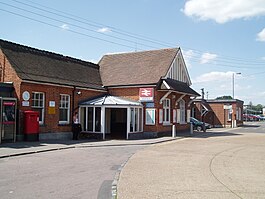Wickford railway station
| Wickford |
|
|---|---|

Station entrance
|
|
| Location | |
| Place | Wickford |
| Local authority | Basildon |
| Grid reference | TQ745936 |
| Operations | |
| Station code | WIC |
| Managed by | Abellio Greater Anglia |
| Number of platforms | 4 |
| DfT category | C2 |
| Live arrivals/departures, station information and onward connections from National Rail Enquiries |
|
| Annual rail passenger usage* | |
| 2011/12 |
|
| – Interchange | 0.553 million |
| 2012/13 |
|
| – Interchange |
|
| 2013/14 |
|
| – Interchange |
|
| 2014/15 |
|
| – Interchange |
|
| 2015/16 |
|
| – Interchange |
|
| History | |
| Key dates | Opened 1889 |
| National Rail – UK railway stations | |
| * Annual estimated passenger usage based on sales of tickets in stated financial year(s) which end or originate at Wickford from Office of Rail and Road statistics. Methodology may vary year on year. | |
|
|
|
Wickford railway station is on the Shenfield to Southend Line and is also the western terminus of the Crouch Valley Line in the east of England, serving the town of Wickford in the Basildon district of Essex. It is 29 miles 2 chains (46.7 km) down-line from London Liverpool Street and is situated between Billericay to the west and, to the east Rayleigh on the Southend Line and Battlesbridge on the Crouch Valley Line. Its three-letter station code is WIC.
The vast majority of services on both lines connect to the Great Eastern Main Line at Shenfield for Liverpool Street. Wickford station and all trains serving it are currently operated by Abellio Greater Anglia.
The station was previously called Wickford Junction when the Crouch Valley route to Southminster also included a branch to Maldon West and more agricultural traffic passed through the station.
Wickford station comprises two main line platforms (platform 2 for eastbound services and 3 for westbound services towards London), and two branch line bay platforms (numbers 1, which is used for trains from Southminster and 4, which is very rarely used) at the eastern end of the station. At the London end of the station there once was a goods yard and turntable for steam locomotives; a couple of sidings remain here for storing engineering vehicles or failed trains, but much of the railway land here is now in use as a car park for passengers.
...
Wikipedia
